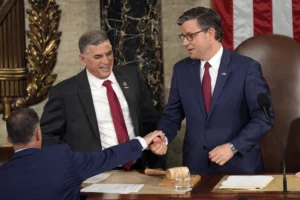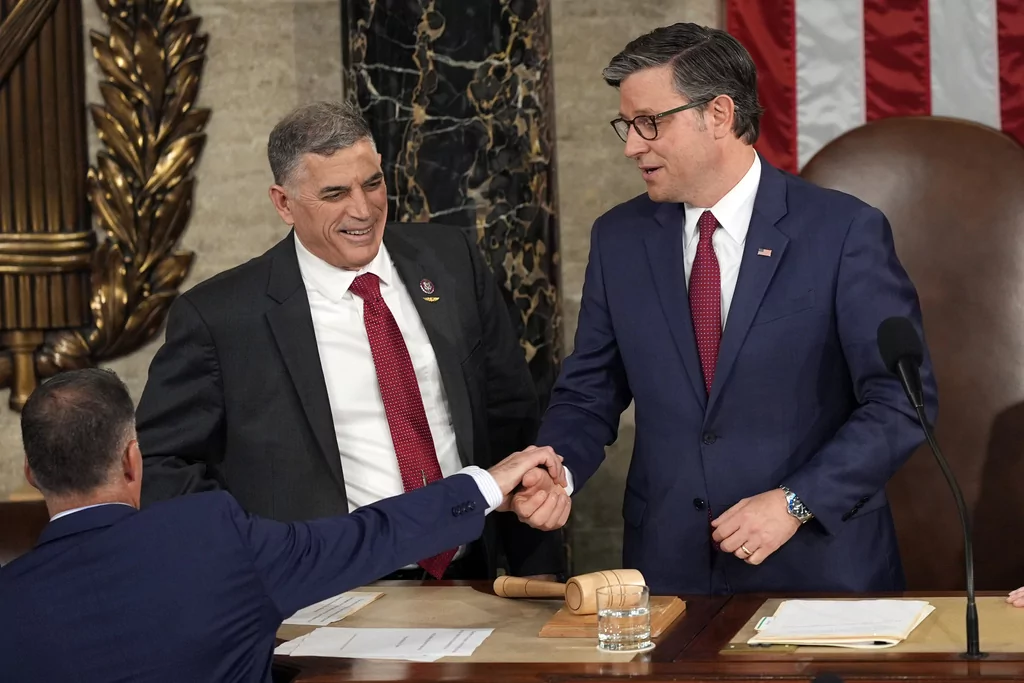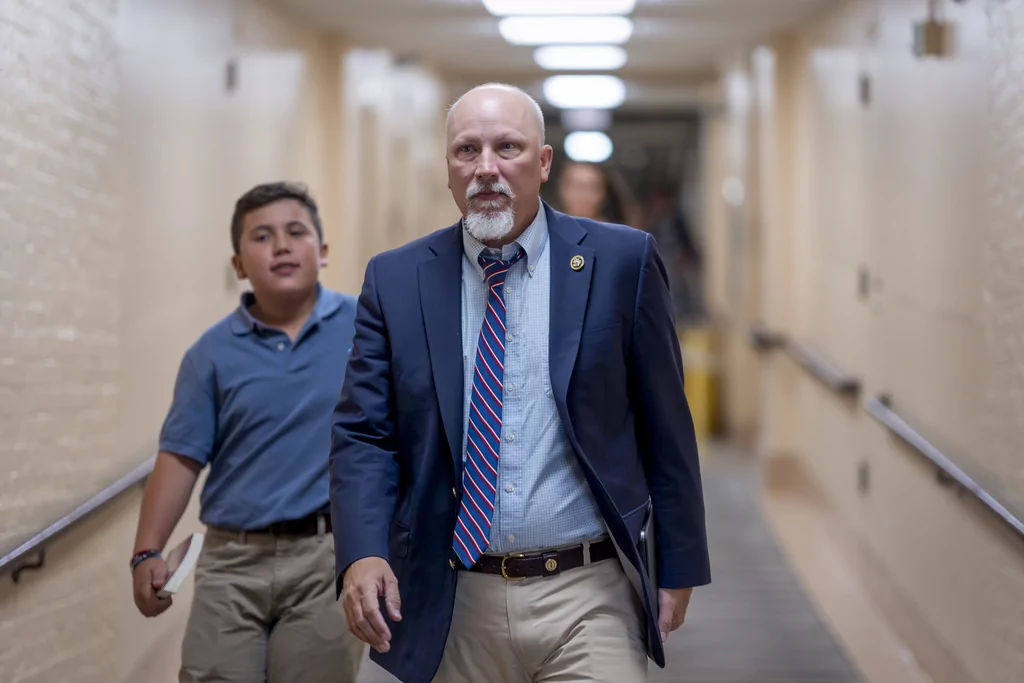
The House Freedom Caucus’s gamble on a short-term government funding proposal could galvanize its base to expand the Republicans’ congressional majority and reelect former President Donald Trump this fall.
The caucus has attached the SAVE Act, a bill that prevents noncitizens from voting in federal elections, to a short-term spending proposal that would fund the government until the next president is inaugurated. The conservative group hopes that as the lower chamber reconvenes, the Republican conference, led by House Speaker Mike Johnson (R-LA), will support its continuing resolution that avoids a lame-duck omnibus bill.
Congress must pass a funding bill by Oct. 1 to avoid a government shutdown. The House majority could elect to support a stop-gap funding measure that funds the government through November or December. That move, however, would set up the lower chamber to squabble their way through a massive omnibus funding bill during a lame-duck session before Christmas. The House Freedom Caucus and other conservative congressional members are opposed to such a measure, which they worry “will no doubt be full of unreasonable levels of spending and bad policy that would certainly tie the hands of especially a future Republican administration, a Trump administration.”
The caucus’s insistence on attaching the SAVE Act, which passed the House in July, to its spending proposal comes as conservatives say record levels of illegal immigrants coming across the U.S.-Mexico border could cast votes and change the course of critical elections.
“As I travel across this country, you know, and you’re encouraging people to show up and to vote, their biggest concern is the sanctity of our election process,” Rep. Michael Cloud (R-TX) told the Washington Examiner. The Georgia Republican has been a Freedom Caucus member since his election in 2018.

The 2024 presidential election battle between Trump and Vice President Kamala Harris has been heavily defined by immigration. As the majority of voters continue to say border security is one of their top priorities, rhetoric about illegal immigrants “rigging” elections through fraudulent voting has become a talking point guaranteed to generate enthusiasm in Trump’s base, though there has been no widespread evidence to support this claim.
In an election cycle in which the GOP is fighting to retain and expand a slim majority in the lower chamber and Trump stares down a tightening race against Harris, revving up Republicans about top voter issues is imperative to flipping seats.
“The only way you’re going to have a strong majority, the only way President Trump’s going to get in the White House,” Rep. Chip Roy (R-TX) declared, “is for us to do our job and have a message that we can sell to the American people.”
For Republicans, part of the message they hope will win them victories on Nov. 5 is warning of the possible dangers illegal immigrants pose to citizens.
“They don’t want illegals running around all over the place,” Roy said of his interactions with voters. “They want their country back. They want a sovereign nation.” His words come as voters trust Trump more on immigration than they do Harris, according to national polling.
“The border is a vulnerability for Biden and for Harris. Polls show that voters want a stronger border than is currently the case,” Stephen Farnsworth, a professor of political science at the University of Mary Washington, said.
Rep. Andrew Clyde (R-GA), another Freedom Caucus member who was elected in 2021, agreed that the border is a critical topic this election cycle that his caucus is prepared to target.
“If you don’t have a secure border, you’re not going to have a secure nation,” the Georgia congressman said.

The SAVE Act is endorsed by numerous conservative leaders and organizations and builds on the border messaging Republicans believe is the winning strategy to produce a red wave on Election Day. “Part of politics is to define where you want to go and make that a centerpiece of elections,” Roy noted.
He argued that bringing the measure up for a vote in Congress “would be a very strong, very strong point for the voters to have as they head to the polls in November.” Promising to protect the integrity of U.S. elections from the votes of noncitizens, the bill is backed by Stephen Miller, one of Trump’s closest border advisers when he was in the White House. Roy said he has had “ongoing conversations” with Miller and the Trump team on the border. “Steven and I work together on a lot of issues,” he commented.
Trump often talks about election integrity at his rallies to the cheers of thousands.
“Our primary focus,” he said during a North Carolina campaign stop on Aug. 21, “is to make sure they don’t cheat because we have all the votes.”
The Freedom Caucus says it has Trump’s support on the unique spending measure, as well as Johnson’s.
“I believe the House Majority led by Speaker Johnson wants to pass this. I believe President Trump wants us to pass this,” Roy said Wednesday. The two men’s support is crucial to attaching the bill to a continuing resolution.
The caucus’s confident rhetoric comes as it paves an uncertain path over the next few months. It finds itself without an uncertain leadership situation after Rep. Bob Good (R-VA) lost his primary this spring to a Trump-endorsed challenger. Speculation has swirled over who the conservative group’s next leader will be as the notoriously secretive HFC prepares to make the announcement in September.
“Really, that’s a family matter about how that will come about,” Cloud replied when pressed about leadership changes.
“I’ll keep all those conversations internal,” Roy remarked in a similar deflection. “We’ve had good leadership at every turn,” he said, praising Good, Rep. Scott Perry (R-PA), Rep. Andy Biggs (R-AZ), Rep. Jim Jordan (R-OH), and Rep. Mark Meadows (R-NC) as “previous leaders of the Freedom Caucus that I’m proud to call friends.” Roy himself is rumored to be one of the top contenders for the leadership position as well as Perry and Biggs.
Farnsworth, the political science professor, indicated that the next caucus leader would likely be a seasoned member of the lower chamber.
“Congress tends to work largely on the basis of seniority. If any group turns toward a newer, less experienced leader, that may limit their effectiveness, at least in the short term,” the political scientist said.
If seniority is the dealbreaker, the caucus will likely turn to Roy, Perry, or Biggs as its next leader, putting less seasoned Reps. Andy Ogles (R-TN) and Lauren Boebert (R-CO), both floated as potential HFC leaders, out of the running.
Aside from the critical leadership shift, caucus members are also facing the chaos of the 2024 election cycle. Their hopes of implementing a conservative agenda and reducing spending levels next spring ride on Trump winning a second term.
Although critics claim the Trump campaign is floundering and say the former president’s feisty rhetoric and personal attack on Harris are derailing the GOP, Freedom Caucus members remain confident.
Clyde “firmly” expects Trump to win a second term and says the country “needs to understand its policy over personality.”
“That’s what matters because that’s what affects Americans’ daily lives,” he said.
Roy added that Republicans could gain “anywhere from a similar small majority to a 15-seat-ish majority” on Election Day.

Even as the caucus’s members face an uncertain future, it could stand a solid chance of winning a battle in the next month to attach the SAVE Act to a short-term spending measure. In the fall of 2023, the caucus proved its political weight after some of its members helped oust the most powerful Republican in the House of Representatives from power. Former House Speaker Kevin McCarthy’s fall from leadership came after he became embroiled in conflicts with some caucus members about his spending deal with President Joe Biden.
HFC members proudly proclaim that they exist, as Roy put it, to challenge the “status quo.”
“And when you challenge the status quo, you rock the boat,” he reflected.
Part of their ability to wield influence comes from the GOP’s razor-thin majority. With just a four-seat advantage, the caucus, which holds roughly three dozen members, holds a great deal of power.
“Any time there’s a small majority, the more extreme voices will have a disproportionate influence,” Farnsworth said.
As the caucus hopes for a second Trump term, members also churning through what the caucus will prioritize in 2024. “We’re going to keep coming up with new ideas,” Cloud promised.
Roy expressed a desire to tackle “massive” regulatory power “killing” American consumers. The Texas congressman also signaled a Freedom Caucus partnership with Robert F. Kennedy Jr. to target healthcare could come down the road, calling the one-time independent presidential candidate “a friend.” Kennedy recently appeared to step into the Trump campaign as a health adviser, pushing a “Make America Healthy Again” agenda after suspending his independent presidential bid to endorse the former president.
Throughout the 16 months he spent on the campaign trail, Kennedy focused much of his attention on the chronic disease “epidemic” growing in the country. The Kennedy scion says Trump wants to make efforts to target chronic disease “his legacy.”
CLICK HERE TO READ MORE FROM THE WASHINGTON EXAMINER
Roy believes Kennedy’s pet issue could be “an opportunity for Republicans.”
“What I call health, healthcare, freedom, and making sure we’re restoring power to people and giving them healthier options, and getting them out of these massive bureaucracies and corporations that are killing them — I think RFK is going to be an important voice for that, for President Trump,” Roy said.







